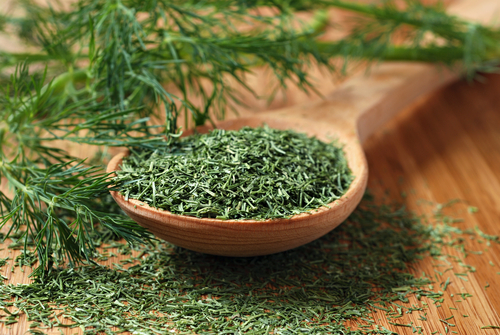Short answer
Dill is a popular herb that has been used for centuries for its nutritional and medicinal properties. Dill is also a very powerful antioxidant that can be ingested, inhaled or used topically. Medicinal levels of dill are not recommended in pregnancy due to potential risk of miscarriage.
Recommended Alternative
Long answer
Dill is an ancient herb that provides many health benefits. Dill dates back to the bible and is written in Egyptian manuscripts that are over 5,000 years old. Dill can grow up to 5 feet high and is a fernlike, yellow flowering plant. There are multiple uses for dill seeds, leaves and flowers. Although pickles can be made without dill, the dill seeds and flowers have the strongest flavor and are a popular addition to pickle brine. Dill seeds can be used whole or ground and add great flavor to soups, vegetables, fish, meats, bread, eggs, stews, cheese spreads and teas. The leaves and flowers can be dried and used to flavor any recipe.
From a nutritional standpoint, dill is a great source of vitamin A and vitamin C. Dill is high in calcium. One tablespoon of dill contains more calcium than a third of a cup of milk. Dill contains many amino acids which are the building blocks of protein. Other great nutrients include folate, iron, manganese, niacin, riboflavin, magnesium, potassium, phosphorous and fiber. Dill contains flavonoids (phytonutrients that are natural plant chemicals) making it a powerful antioxidant. Dill helps to combat toxic free radicals that enter our bodies daily.
We live in a very toxic society and when toxins enter our body they can enter via our skin, our digestive tract and our pulmonary tract. These impurities have an adverse impact on the body and cause the formation of free radicals. These free radicals cause oxidation of the internal body that can lead to cellular damage and DNA damage. This can predispose to degenerative disease, inflammatory disease, vital organ damage or malignancy. Over the centuries dill has been used for its antioxidant and anti-inflammatory properties. Dill can be used to support healthy glucose levels. Dill has immune boosting properties and there is evidence that dill enhances detoxification pathways in the body. Dill has been used for its antimicrobial properties and over the centuries dill was recommended to help with menstrual cramps, digestion, energy and depression. Researchers feel that dill has cancer prevention properties and has been deemed “chemoprotectant.” Research has also demonstrated the ability of dill to lower cholesterol and triglyceride levels in the blood stream.
The dill plant and the seed can be made into healthy oil. This oil can be added to teas, used topically, added to soaps and shampoos or inhaled. Dill oil is used for digestive support and can help with alleviating constipation, irritable bowel, flatulence, bloating, reflux or loss of appetite. Dill oil has a calming effect and can reduce nervousness, combat stress, promote restful sleep and help with anxiety and depression. Topical dill oil can help with wrinkles and joint pain. Because of its antimicrobial properties the oil can be used to prevent infections of the skin and scalp.
In some individuals, topical dill oil can cause an irritation or rash. Dill is not recommended in pregnancy as it may lead to a miscarriage.
Possible short-term side effects
- rash when used topically
- high doses could cause miscarriage

Benefits
- high in vitamin a and c
- high in calcium and iron
- can help lower blood lipid levels
- supports healthy glucose levels
- supports digestion
- supports healthy urinary function
- natural anti-inflammatory and powerful antioxidant
- immune booster and natural antimicrobial
- calming effect
- can help joint pain
- can help with wrinkles
Our Wellness Pick (what is this?)
Simply Organic Dill Weed
- Certified Organic
- Cut & Sifted variety
- Pure Anethum graveolens L.
- Non-irradiated
- 0.81 oz container
 Approved by
Approved by 















